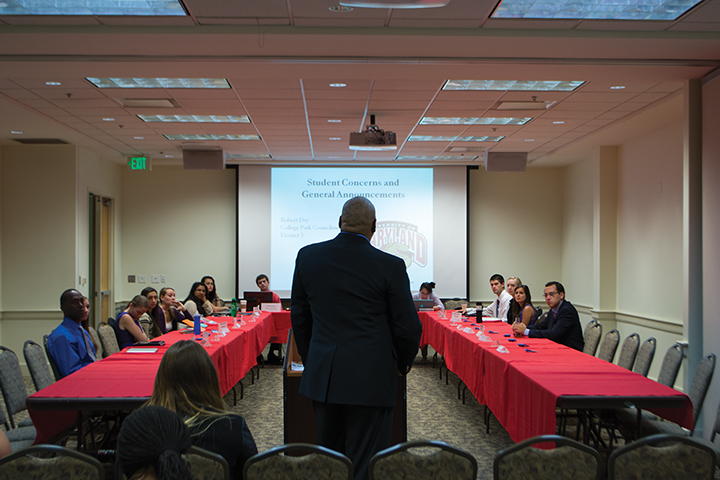
Student Government Association
With Shab-e Yalda, a celebration of the winter solstice, about two months away, the Iranian Students’ Foundation found themselves $3,618 short of their proposed budget.
The group was one of 39 student groups denied money in the most recent round of Student Government Association group funding allocations. Though they were able to appeal the rejection, the ISF is joining a chorus of student groups questioning whether the SGA’s new fund allocation process is an improvement.
The SGA introduced the new process in spring 2013 after two years of reconstructive work. Rather than having student groups apply for a lump sum every year, the SGA switched to a system of monthly deadlines.
With more than 800 student groups on campus, SGA funding hasn’t been able to keep up. In 2012, officials had $451,000 to dole out, but student groups requested about $2.5 million.
The monthly deadlines and tighter regulations the SGA put in place over the summer were intended to cut down on unnecessary expenses. But the problem isn’t lack of funds, ISF President and senior aerospace engineering major Pegah Pashai said — it’s communication.
The ISF, a decades-old organization that promotes Iranian culture, planned to charge admission for an Iranian winter solstice celebration — a practice SGA wanted an explanation for as part of a new effort to enforce standing regulations. Pashai said the group would have sent the information with their application, but weren’t aware they needed to do so.
Six other groups who applied for funding this September were also denied for failing to give a reason for charging admission to their events.
The first round of funding under the new system left many groups unhappy.
Several performing groups, for example, were denied because they requested money too close to the date of their event. Under the new rules, groups must apply for funds a certain amount of time before a specific event — 30 days before if the group wants $1,500 or less and 60 days before if it wants more than $1,500. The policy is intended to give the SGA assurance that their money doesn’t go to waste on events that don’t happen.
Though groups had the ability to apply in the spring for fall funds, many said they were inadequately informed about the rule changes. Group leaders were required to attend a budget workshop that clarified the new rules, but that too left groups uncertain.
Break dancing group B-Terps, which received SGA funding for events for the past two years, applied as usual, but the SGA denied the group’s application because of insufficient documentation.
“I went to the budget workshop, and it kind of explained things and kind of didn’t,” said junior materials engineering major Allen Chang, the group’s treasurer. “I had a general misunderstanding of what I was required to give.”
That’s the kind of problem SGA financial affairs vice president Andrew Aggabao said he hopes will decline as students get used to the new system.
Previously, Aggabao said, students would submit their applications to the “black hole of the finance committee” once a year and then hear back later with little insight into how or why the governing body had reached a decision.
Under the new system, the finance committee has added two new positions to increase transparency. The committee now has a statistician and a communication liaison.
The committee estimates how much it can spend each month based on average spending from the past five years in the new system. In April, for example, the committee estimated that based on its budget, it could allocate about $70,000, and it has not yet gone over its estimates.
The committee understands it’s a learning process, Aggabao said, which is why it has also responded to objections from groups such as ISF.
At a marathon Wednesday meeting, the SGA cut its teeth on the new system. Ten different groups appealed their decisions to the finance committee, and three decided to make their case directly to the SGA with mixed results.
Ultimately the Terrapin Beats Society was denied the $200 it requested, but Muslims Without Borders received partial funding and the ISF received all the funds it requested.
“When we’re appealing, it may seem like we’re breaking the rules, but really it was a miscommunication,” Pasha said.



